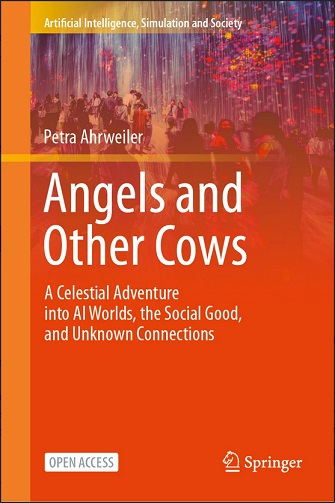Inklusive Wissenschaftskommunikation im Forschungsprojekt AI FORA: Ein Fantasy-Roman zum Einsatz von KI bei der Vergabe öffentlicher Dienstleistungen

https://media.springernature.com/full/springer-static/cover-hires/book/978-3-031-60401-0?as=webp
Veröffentlichung
Petra Ahrweiler
Angels and Other Cows
A Celestial Adventure into AI Worlds, the Social Good, and Unknown Connections
Springer Nature Switzerland, Juni 2024
DOI: 10.1007/978-3-031-60401-0
https://link.springer.com/book/10.1007/978-3-031-60401-0
In immer mehr Ländern der Welt nutzen öffentliche Verwaltungen zunehmend Künstliche Intelligenz (KI)-basierte Algorithmen, um - in der Hoffnung auf mehr Effizienz und Objektivität - über die Bereitstellung öffentlicher Sozialdienstleistungen, wie zum Beispiel Arbeitslosenunterstützung, zu entscheiden.
KI-basiert werden Profile von Bürgern und Bürgerinnen maschinell beurteilt, ob und in welcher Höhe sie knapp bemessene öffentliche Güter erhalten sollen. Weltweit sind die Entscheidungskriterien jedoch höchst kontingent: Es gibt keinen „one-fits-all“-Ansatz von sozialer Gerechtigkeit, der überall als gerecht empfunden würde. Außerdem wird den eingesetzten Systemen vorgeworfen, existierenden Bias und Diskriminierung in der Gesellschaft noch zu verstärken, da mit Daten der Vergangenheit gearbeitet wird.
Mit dem Ziel, „Bessere KI“ durch partizipative Beteiligung gesellschaftlicher Interessengruppen zu gestalten, untersucht das internationale Forschungsprojekt „Artificial Intelligence for Assessment“ (AI FORA) den Status quo und die Möglichkeiten vom KI-Einsatz in diesem Bereich. Das Projekt verwendet einen kulturvergleichenden Ansatz in Hinblick auf die Länder Deutschland, Estland, Spanien, Indien, China, Nigeria die Ukraine, den Iran und die USA, um auszuloten, ob und wie KI zu mehr sozialer Gerechtigkeit beitragen kann.
Ergebnisse des Forschungsprojekts sind prinzipiell für alle Bürgerinnen und Bürger von Interesse – sei es als Antragstellende, Empfängerinnen und Empfängern von Leistungen, Mitglieder vulnerabler Gruppen oder Steuerzahlende. Forschung ist aber oft nur für Expertinnen und Experten zugänglich, häufig von deren Interessen geprägt und in deren Sprache formuliert. Eben dies wirkt als Barriere, die v. a. besonders Betroffene, d. h. diejenigen, die einen besseren Zugang zu öffentlichen Gütern benötigen, ausschließt. Daher braucht es inklusive Formate, um breite Zielgruppen zu erreichen.
Ein solches Format ist der Roman „Angels and other Cows“ von Prof. Dr. Petra Ahrweiler, der Genres wie Sci-Fi, Romance, Adventure, Mystery und Comedy miteinander verbindet. Der jetzt erschienene Roman sowie drei noch folgende Bücher sollen zur inklusiven Wissenschaftskommunikation beitragen.
Suche nach globaler Gerechtigkeit mithilfe von KI
Die Geschichte von "Angels and other Cows" spielt sich sowohl im Himmel als auch auf der Erde ab. Der irdische Teil erzählt die Abenteuer von Gabriel und Tilda, die für eine internationale Hilfsorganisation namens B1 arbeiten. Ihre Aufgabe ist es, Fallstudienpartnerschaften für ein Projekt zur KI-gestützten sozialen Bewertung zu finden. In Zusammenarbeit mit Partnerinnen und Partnern aus verschiedenen Ländern und gesellschaftlichen Hintergründen erforschen sie die Auswirkungen von Werten und Kultur auf die soziale Bewertung und beleuchten Fragen der Voreingenommenheit und Diskriminierung in verschiedenen Systemen, die Menschen für die Gewährung von Sozialhilfe kategorisieren. Der Roman bezeichnet dies als autoethnografisches Lernen. Gabriel und Tilda ringen dabei mit der Definition ihrer eigenen Beziehung, die von Vorurteilen, gegenseitigen Bewertungen, Machtkämpfen zwischen den Generationen und milieuspezifischen Weltanschauungskonflikten geprägt ist.
Ihr persönlicher Weg ist verwoben mit einem globalen Plädoyer für Einheit in einer Welt dystopischer Zustände: Begrenzte öffentliche Mittel, Wirtschaftskrisen und ungleiche Lebenschancen in verschiedenen Ländern. Die Welt scheint in antagonistische Gesellschaften mit partikularen religiösen und soziokulturellen Glaubenssystemen geteilt, die soziale Ungerechtigkeit aufrechterhalten. Lesende erhält ein umfassendes Verständnis für diese komplexen Themen und begeben sich mit Gabriel und Tilda auf die Suche danach, ob KI diese Probleme verschlimmern oder lindern kann. Leser und Leserinnen erhalten auch Einblicke in die Technologie und ihre Funktionsweise.
Der himmlische Teil der Geschichte ist der Reflexion gewidmet. Während Gabriel und Tilda sich mit ihrer intellektuellen und emotionalen Verbindung auseinandersetzen, werden sie von zwei Schutzengeln, GA und TA, begleitet, die die Aufgabe haben, den Planeten durch interkulturelle Integration zu retten. Diese Engel spiegeln die Kämpfe ihrer Schützlinge und sorgen für komische Abwechslung. Die "Stimme der Weisheit" wird durch den englischen Benediktinermönch Bede Griffiths repräsentiert, der Tilda und Gabriel in ihrer unwahrscheinlichen Liebesgeschichte enthusiastisch unterstützt. Auf dieser Ebene werden im Roman philosophische und ethische Fragen diskutiert und verhandelt.
Bei „Angels and Other Cows. A Celestial Adventure into AI Worlds, the Social Good, and Unknown Connections” handelt es sich um den einleitenden Roman aus einer Reihe von insgesamt vier Open-Access-Büchern, die bei Springer Nature erscheinen. Zwei wissenschaftliche Bücher zu den Projektergebnissen sowie abschließend ein evaluierenden Wissenschaftsroman werden noch folgen.
Das AI FORA-Projekt wird von der VolkswagenStiftung im Rahmen ihres Programms „Künstliche Intelligenz und die Gesellschaft von morgen“ gefördert. Für das Konzept zur inklusiven Wissenschaftskommunikation hat TISSS Lab als koordinierende Institution zusätzliche Mittel in Höhe von 36.000 EUR erhalten.
Graphic Novel zum Buch geplant
Mit dem Roman sollen die Forschungsthemen und besonders die Forschungsergebnisse rund um den Einsatz von KI im öffentlichen Sektor einem möglichst breiten Publikum zugänglich gemacht werden. Damit sollen Leserinnen und Leser für die akademische Forschung begeistert werden. Demnächst wird auch eine Graphic Novel zum Roman erscheinen, die als zusätzlicher Baustein der inklusiven Strategie der Wissenschaftskommunikation gedacht ist. Die graphische Darstellung soll ein weiteres Medium anbieten und vor allem jüngere Leute erreichen.
Das Buch „Angels and Other Cows. A Celestial Adventure into AI Worlds, the Social Good, and Unknown Connections” wurde bei Springer Nature veröffentlicht und ist sowohl gedruckt wie auch kostenfrei in Open Access unter diesem Link erhältlich.





